Engineering Management (ENS5543) - Selection Criteria Report
VerifiedAdded on 2022/08/17
|6
|1230
|16
Report
AI Summary
This report is a student's response to specific selection criteria within an Engineering Management unit (ENS5543). The report addresses key skills such as the ability to work effectively both independently and as part of a team, demonstrating this through experiences in class, during an engineering firm attachment, and in various activities. It also highlights the development of excellent interpersonal skills, including working without supervision, and the acquisition of effective communication skills through classroom learning, daily life, and group discussions. The student emphasizes the practical application of these skills, providing examples and experiences to support the claims. The report concludes by summarizing the importance of these skills in securing and maintaining a job, especially in engineering. References to relevant literature are provided to support the analysis.
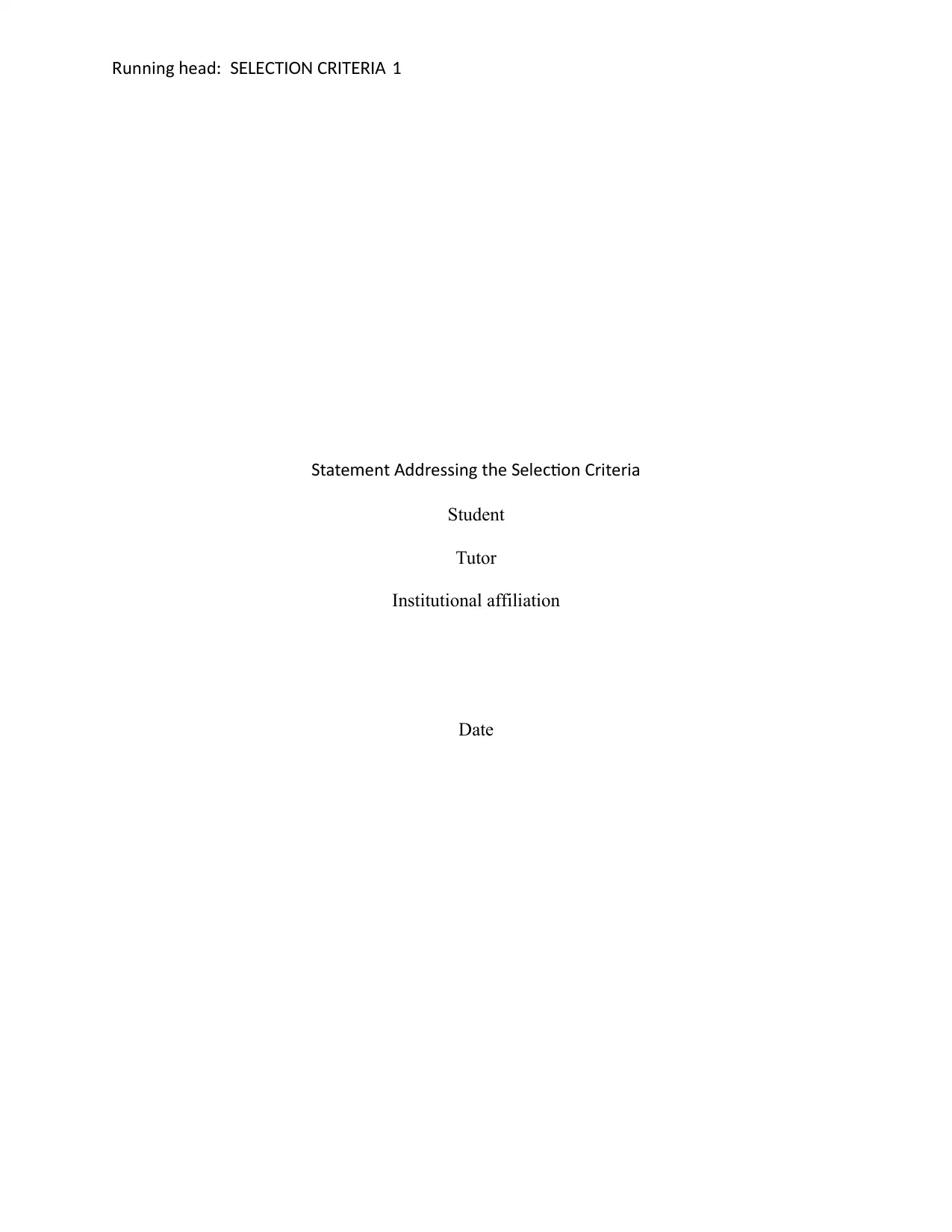
unning eadR h : CT C TSELE ION RI ERIA 1
tate ent ddressing t e ele tion CriteriaS m A h S c
Student
Tutor
Institutional affiliation
Date
tate ent ddressing t e ele tion CriteriaS m A h S c
Student
Tutor
Institutional affiliation
Date
Paraphrase This Document
Need a fresh take? Get an instant paraphrase of this document with our AI Paraphraser
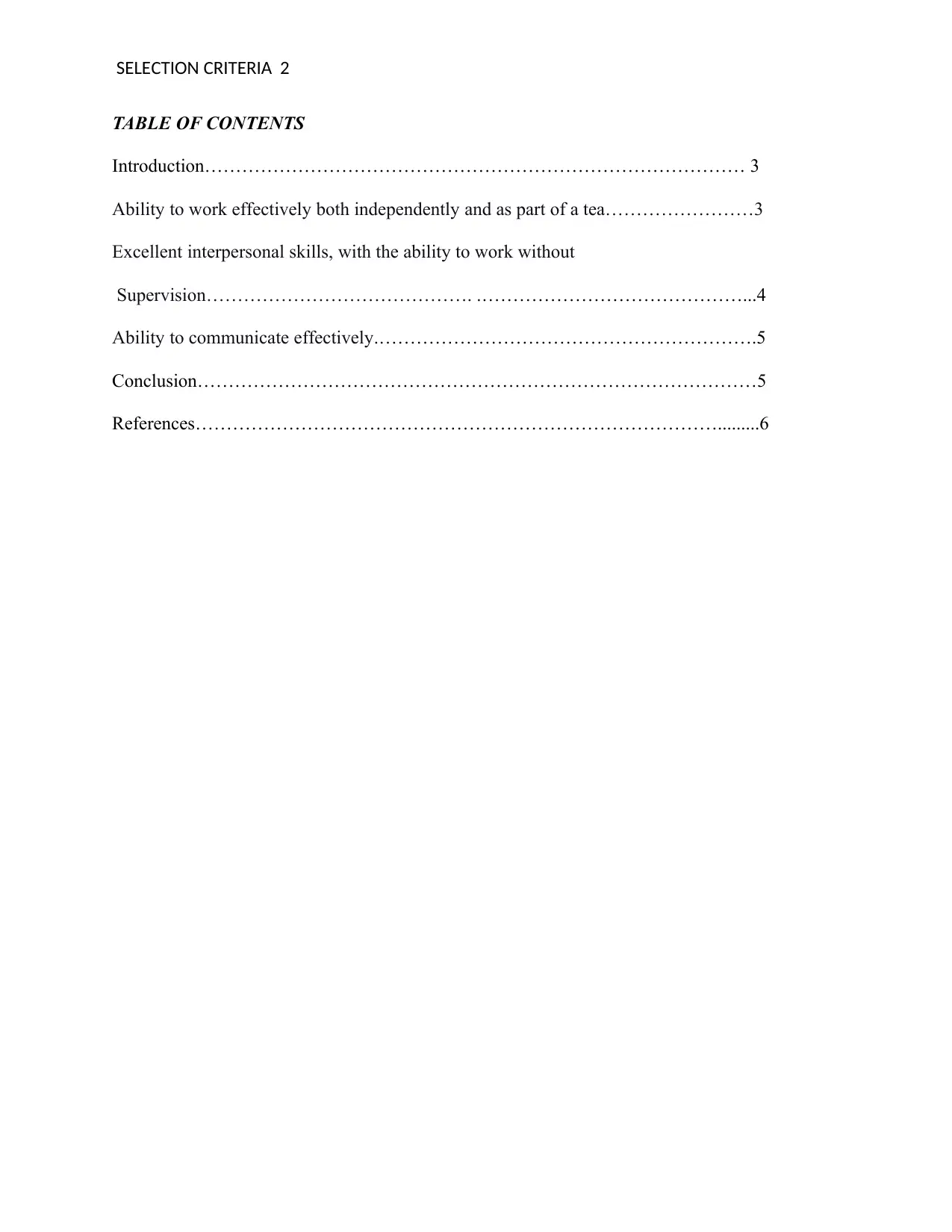
CT C TSELE ION RI ERIA 2
TABLE OF CONTENTS
Introduction…………………………………………………………………………… 3
Ability to work effectively both independently and as part of a tea……………………3
Excellent interpersonal skills, with the ability to work without
Supervision……………………………………. .……………………………………...4
Ability to communicate effectively.…………………………………………………….5
Conclusion………………………………………………………………………………5
References………………………………………………………………………….........6
TABLE OF CONTENTS
Introduction…………………………………………………………………………… 3
Ability to work effectively both independently and as part of a tea……………………3
Excellent interpersonal skills, with the ability to work without
Supervision……………………………………. .……………………………………...4
Ability to communicate effectively.…………………………………………………….5
Conclusion………………………………………………………………………………5
References………………………………………………………………………….........6
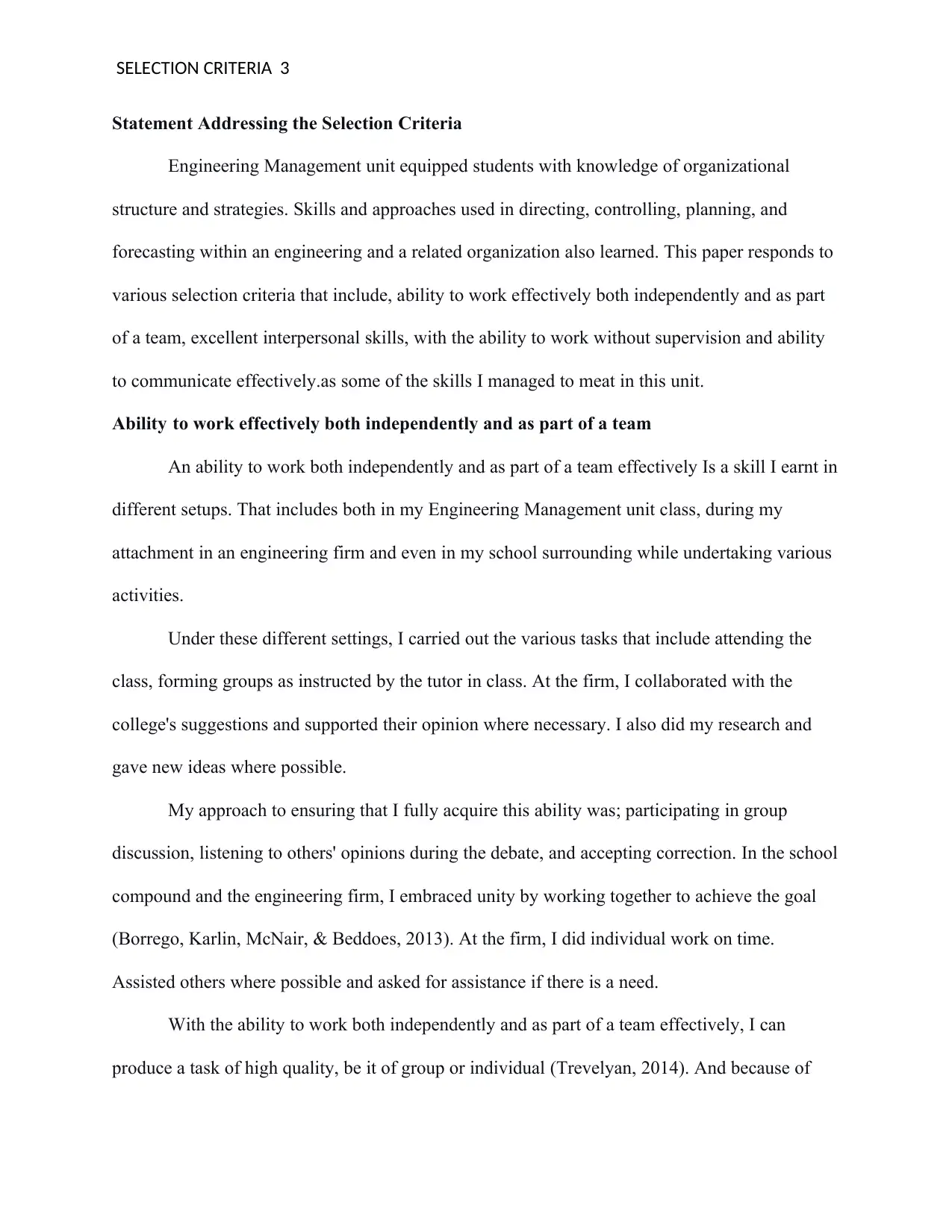
CT C TSELE ION RI ERIA 3
Statement Addressing the Selection Criteria
Engineering Management unit equipped students with knowledge of organizational
structure and strategies. Skills and approaches used in directing, controlling, planning, and
forecasting within an engineering and a related organization also learned. This paper responds to
various selection criteria that include, ability to work effectively both independently and as part
of a team, excellent interpersonal skills, with the ability to work without supervision and ability
to communicate effectively.as some of the skills I managed to meat in this unit.
Ability to work effectively both independently and as part of a team
An ability to work both independently and as part of a team effectively Is a skill I earnt in
different setups. That includes both in my Engineering Management unit class, during my
attachment in an engineering firm and even in my school surrounding while undertaking various
activities.
Under these different settings, I carried out the various tasks that include attending the
class, forming groups as instructed by the tutor in class. At the firm, I collaborated with the
college's suggestions and supported their opinion where necessary. I also did my research and
gave new ideas where possible.
My approach to ensuring that I fully acquire this ability was; participating in group
discussion, listening to others' opinions during the debate, and accepting correction. In the school
compound and the engineering firm, I embraced unity by working together to achieve the goal
(Borrego, Karlin, McNair, & Beddoes, 2013). At the firm, I did individual work on time.
Assisted others where possible and asked for assistance if there is a need.
With the ability to work both independently and as part of a team effectively, I can
produce a task of high quality, be it of group or individual (Trevelyan, 2014). And because of
Statement Addressing the Selection Criteria
Engineering Management unit equipped students with knowledge of organizational
structure and strategies. Skills and approaches used in directing, controlling, planning, and
forecasting within an engineering and a related organization also learned. This paper responds to
various selection criteria that include, ability to work effectively both independently and as part
of a team, excellent interpersonal skills, with the ability to work without supervision and ability
to communicate effectively.as some of the skills I managed to meat in this unit.
Ability to work effectively both independently and as part of a team
An ability to work both independently and as part of a team effectively Is a skill I earnt in
different setups. That includes both in my Engineering Management unit class, during my
attachment in an engineering firm and even in my school surrounding while undertaking various
activities.
Under these different settings, I carried out the various tasks that include attending the
class, forming groups as instructed by the tutor in class. At the firm, I collaborated with the
college's suggestions and supported their opinion where necessary. I also did my research and
gave new ideas where possible.
My approach to ensuring that I fully acquire this ability was; participating in group
discussion, listening to others' opinions during the debate, and accepting correction. In the school
compound and the engineering firm, I embraced unity by working together to achieve the goal
(Borrego, Karlin, McNair, & Beddoes, 2013). At the firm, I did individual work on time.
Assisted others where possible and asked for assistance if there is a need.
With the ability to work both independently and as part of a team effectively, I can
produce a task of high quality, be it of group or individual (Trevelyan, 2014). And because of
⊘ This is a preview!⊘
Do you want full access?
Subscribe today to unlock all pages.

Trusted by 1+ million students worldwide
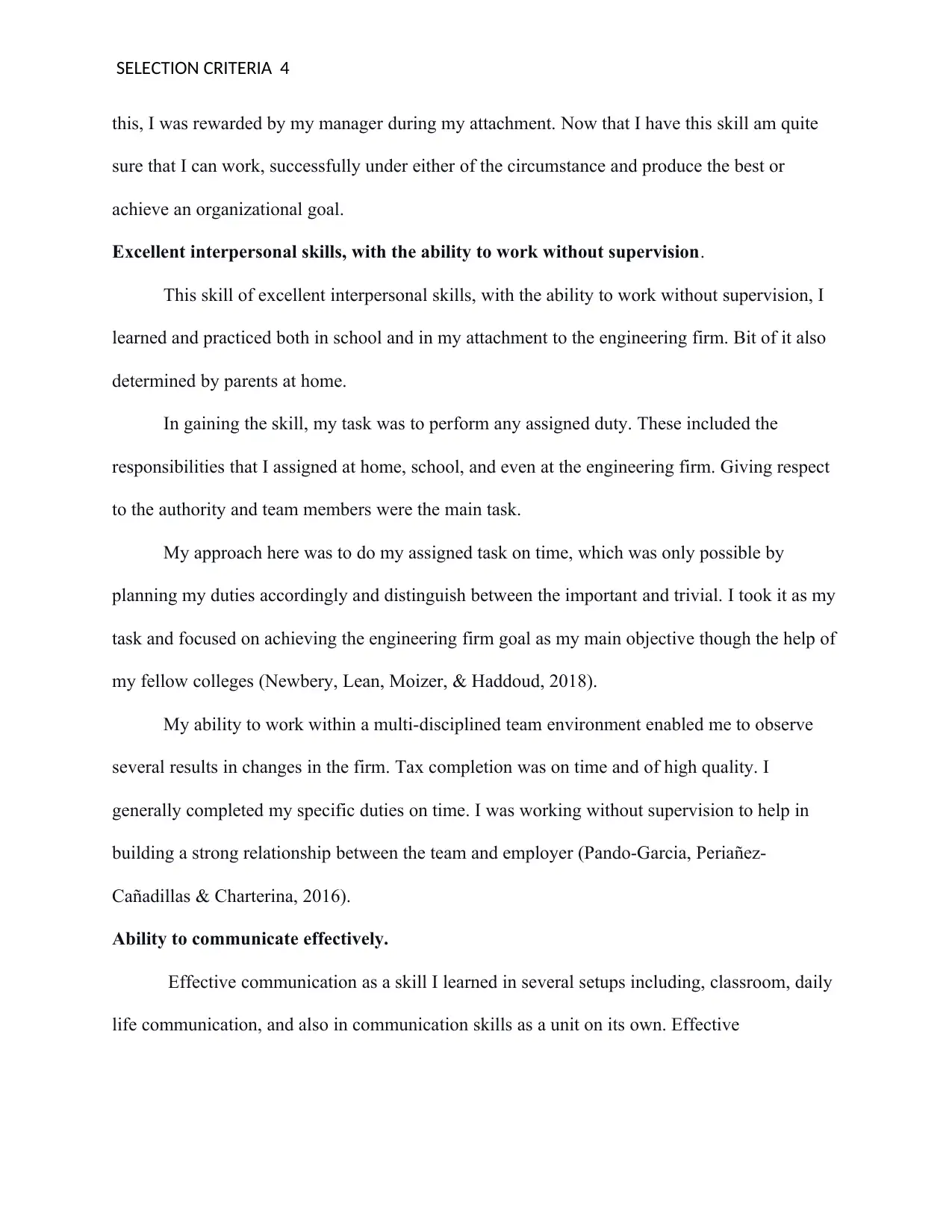
CT C TSELE ION RI ERIA 4
this, I was rewarded by my manager during my attachment. Now that I have this skill am quite
sure that I can work, successfully under either of the circumstance and produce the best or
achieve an organizational goal.
Excellent interpersonal skills, with the ability to work without supervision.
This skill of excellent interpersonal skills, with the ability to work without supervision, I
learned and practiced both in school and in my attachment to the engineering firm. Bit of it also
determined by parents at home.
In gaining the skill, my task was to perform any assigned duty. These included the
responsibilities that I assigned at home, school, and even at the engineering firm. Giving respect
to the authority and team members were the main task.
My approach here was to do my assigned task on time, which was only possible by
planning my duties accordingly and distinguish between the important and trivial. I took it as my
task and focused on achieving the engineering firm goal as my main objective though the help of
my fellow colleges (Newbery, Lean, Moizer, & Haddoud, 2018).
My ability to work within a multi-disciplined team environment enabled me to observe
several results in changes in the firm. Tax completion was on time and of high quality. I
generally completed my specific duties on time. I was working without supervision to help in
building a strong relationship between the team and employer (Pando-Garcia, Periañez-
Cañadillas & Charterina, 2016).
Ability to communicate effectively.
Effective communication as a skill I learned in several setups including, classroom, daily
life communication, and also in communication skills as a unit on its own. Effective
this, I was rewarded by my manager during my attachment. Now that I have this skill am quite
sure that I can work, successfully under either of the circumstance and produce the best or
achieve an organizational goal.
Excellent interpersonal skills, with the ability to work without supervision.
This skill of excellent interpersonal skills, with the ability to work without supervision, I
learned and practiced both in school and in my attachment to the engineering firm. Bit of it also
determined by parents at home.
In gaining the skill, my task was to perform any assigned duty. These included the
responsibilities that I assigned at home, school, and even at the engineering firm. Giving respect
to the authority and team members were the main task.
My approach here was to do my assigned task on time, which was only possible by
planning my duties accordingly and distinguish between the important and trivial. I took it as my
task and focused on achieving the engineering firm goal as my main objective though the help of
my fellow colleges (Newbery, Lean, Moizer, & Haddoud, 2018).
My ability to work within a multi-disciplined team environment enabled me to observe
several results in changes in the firm. Tax completion was on time and of high quality. I
generally completed my specific duties on time. I was working without supervision to help in
building a strong relationship between the team and employer (Pando-Garcia, Periañez-
Cañadillas & Charterina, 2016).
Ability to communicate effectively.
Effective communication as a skill I learned in several setups including, classroom, daily
life communication, and also in communication skills as a unit on its own. Effective
Paraphrase This Document
Need a fresh take? Get an instant paraphrase of this document with our AI Paraphraser
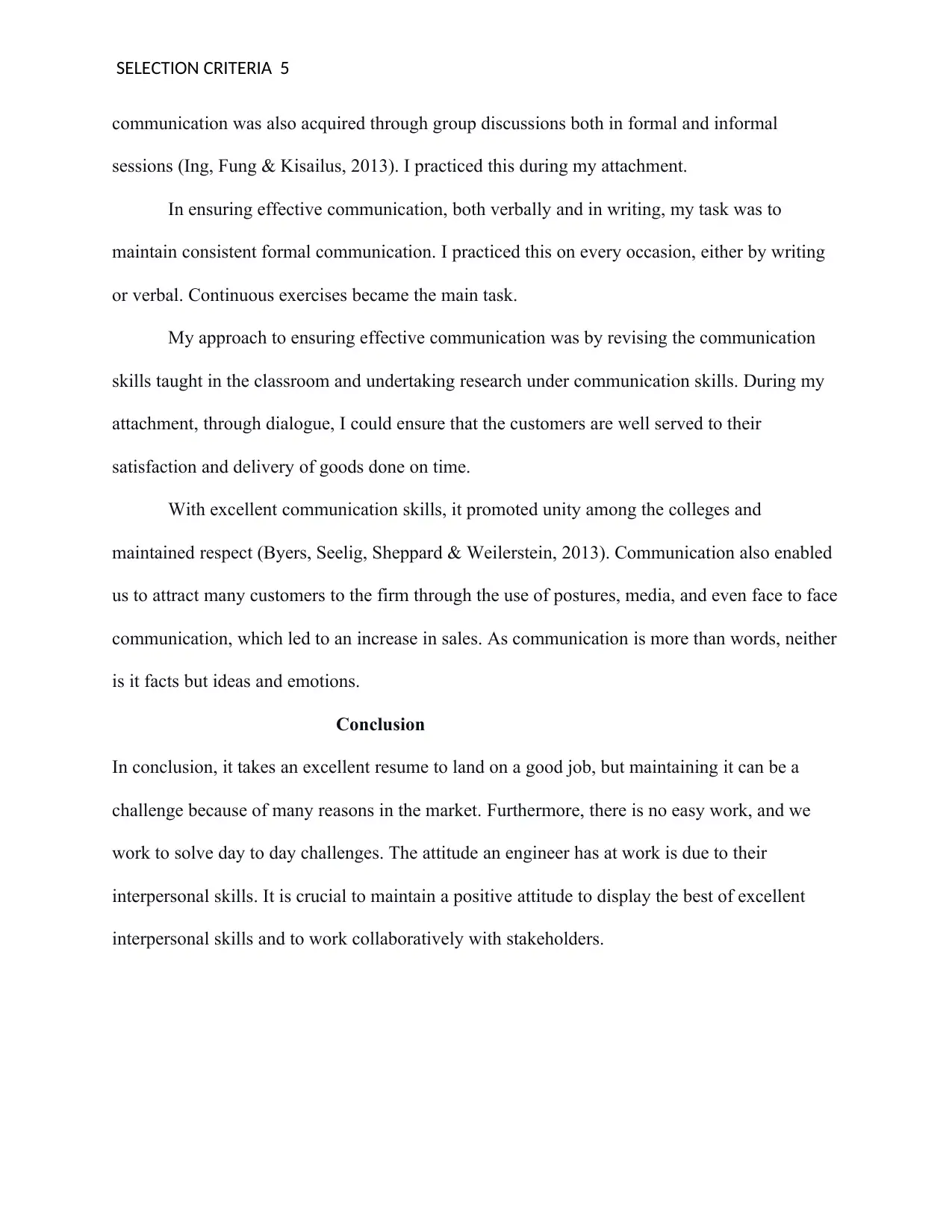
CT C TSELE ION RI ERIA 5
communication was also acquired through group discussions both in formal and informal
sessions (Ing, Fung & Kisailus, 2013). I practiced this during my attachment.
In ensuring effective communication, both verbally and in writing, my task was to
maintain consistent formal communication. I practiced this on every occasion, either by writing
or verbal. Continuous exercises became the main task.
My approach to ensuring effective communication was by revising the communication
skills taught in the classroom and undertaking research under communication skills. During my
attachment, through dialogue, I could ensure that the customers are well served to their
satisfaction and delivery of goods done on time.
With excellent communication skills, it promoted unity among the colleges and
maintained respect (Byers, Seelig, Sheppard & Weilerstein, 2013). Communication also enabled
us to attract many customers to the firm through the use of postures, media, and even face to face
communication, which led to an increase in sales. As communication is more than words, neither
is it facts but ideas and emotions.
Conclusion
In conclusion, it takes an excellent resume to land on a good job, but maintaining it can be a
challenge because of many reasons in the market. Furthermore, there is no easy work, and we
work to solve day to day challenges. The attitude an engineer has at work is due to their
interpersonal skills. It is crucial to maintain a positive attitude to display the best of excellent
interpersonal skills and to work collaboratively with stakeholders.
communication was also acquired through group discussions both in formal and informal
sessions (Ing, Fung & Kisailus, 2013). I practiced this during my attachment.
In ensuring effective communication, both verbally and in writing, my task was to
maintain consistent formal communication. I practiced this on every occasion, either by writing
or verbal. Continuous exercises became the main task.
My approach to ensuring effective communication was by revising the communication
skills taught in the classroom and undertaking research under communication skills. During my
attachment, through dialogue, I could ensure that the customers are well served to their
satisfaction and delivery of goods done on time.
With excellent communication skills, it promoted unity among the colleges and
maintained respect (Byers, Seelig, Sheppard & Weilerstein, 2013). Communication also enabled
us to attract many customers to the firm through the use of postures, media, and even face to face
communication, which led to an increase in sales. As communication is more than words, neither
is it facts but ideas and emotions.
Conclusion
In conclusion, it takes an excellent resume to land on a good job, but maintaining it can be a
challenge because of many reasons in the market. Furthermore, there is no easy work, and we
work to solve day to day challenges. The attitude an engineer has at work is due to their
interpersonal skills. It is crucial to maintain a positive attitude to display the best of excellent
interpersonal skills and to work collaboratively with stakeholders.
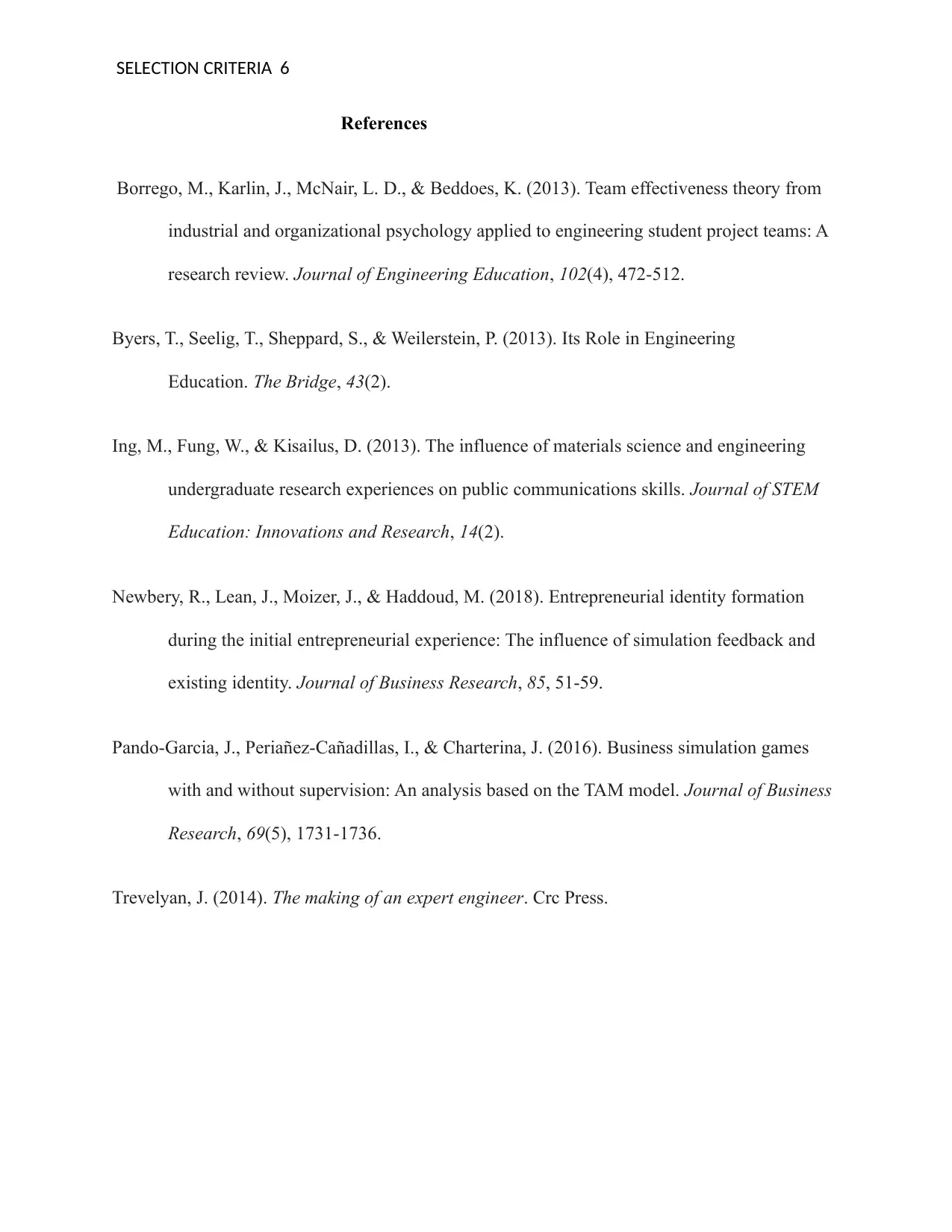
CT C TSELE ION RI ERIA 6
References
Borrego, M., Karlin, J., McNair, L. D., & Beddoes, K. (2013). Team effectiveness theory from
industrial and organizational psychology applied to engineering student project teams: A
research review. Journal of Engineering Education, 102(4), 472-512.
Byers, T., Seelig, T., Sheppard, S., & Weilerstein, P. (2013). Its Role in Engineering
Education. The Bridge, 43(2).
Ing, M., Fung, W., & Kisailus, D. (2013). The influence of materials science and engineering
undergraduate research experiences on public communications skills. Journal of STEM
Education: Innovations and Research, 14(2).
Newbery, R., Lean, J., Moizer, J., & Haddoud, M. (2018). Entrepreneurial identity formation
during the initial entrepreneurial experience: The influence of simulation feedback and
existing identity. Journal of Business Research, 85, 51-59.
Pando-Garcia, J., Periañez-Cañadillas, I., & Charterina, J. (2016). Business simulation games
with and without supervision: An analysis based on the TAM model. Journal of Business
Research, 69(5), 1731-1736.
Trevelyan, J. (2014). The making of an expert engineer. Crc Press.
References
Borrego, M., Karlin, J., McNair, L. D., & Beddoes, K. (2013). Team effectiveness theory from
industrial and organizational psychology applied to engineering student project teams: A
research review. Journal of Engineering Education, 102(4), 472-512.
Byers, T., Seelig, T., Sheppard, S., & Weilerstein, P. (2013). Its Role in Engineering
Education. The Bridge, 43(2).
Ing, M., Fung, W., & Kisailus, D. (2013). The influence of materials science and engineering
undergraduate research experiences on public communications skills. Journal of STEM
Education: Innovations and Research, 14(2).
Newbery, R., Lean, J., Moizer, J., & Haddoud, M. (2018). Entrepreneurial identity formation
during the initial entrepreneurial experience: The influence of simulation feedback and
existing identity. Journal of Business Research, 85, 51-59.
Pando-Garcia, J., Periañez-Cañadillas, I., & Charterina, J. (2016). Business simulation games
with and without supervision: An analysis based on the TAM model. Journal of Business
Research, 69(5), 1731-1736.
Trevelyan, J. (2014). The making of an expert engineer. Crc Press.
⊘ This is a preview!⊘
Do you want full access?
Subscribe today to unlock all pages.

Trusted by 1+ million students worldwide
1 out of 6
Related Documents
Your All-in-One AI-Powered Toolkit for Academic Success.
+13062052269
info@desklib.com
Available 24*7 on WhatsApp / Email
![[object Object]](/_next/static/media/star-bottom.7253800d.svg)
Unlock your academic potential
Copyright © 2020–2026 A2Z Services. All Rights Reserved. Developed and managed by ZUCOL.




